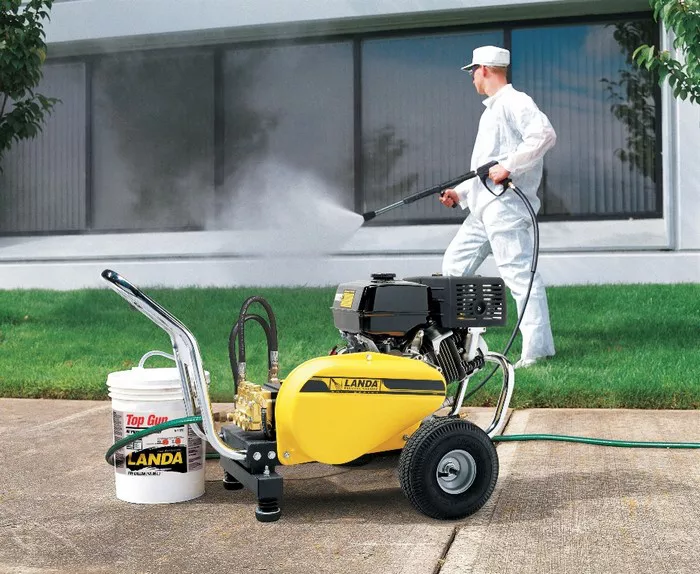Pressure washing has become an indispensable tool for homeowners seeking to maintain the exterior cleanliness of their properties. From removing stubborn stains to revitalizing outdoor surfaces, pressure washers offer unmatched convenience and efficiency. However, the key to successful pressure washing lies not only in the equipment but also in the choice of cleaning agents. In this comprehensive guide, we delve into the nuances of using bleach in pressure washers, exploring the risks, alternatives, and best practices to ensure optimal results and safety.
Pressure washing has soared in popularity as a go-to solution for maintaining the exterior of homes. Its ability to swiftly blast away grime, mold, and mildew from various surfaces has made it a favorite among homeowners looking to restore the luster of their properties. However, the efficacy of pressure washing isn’t solely reliant on the machine’s power; the choice of cleaning agents plays a pivotal role in achieving desired results while preserving the integrity of surfaces.
Why Not Bleach?
While bleach is a potent cleaner renowned for its ability to obliterate tough stains and disinfect surfaces, it’s ill-suited for use in pressure washers. Here’s why:
Damage to the Machine: Bleach, when introduced directly into a pressure washer, can wreak havoc on its internal components. Most modern pressure washers come equipped with a dedicated soap canister designed for gentler cleaning agents. Bleach’s corrosive nature can compromise vital parts such as pump seals, leading to costly repairs or premature machine failure.
Safety Concerns: Handling bleach in a high-pressure environment poses significant risks. Not only can it cause harm to the user through skin or inhalation exposure, but it can also spell disaster for nearby plants and delicate surfaces. The overspray of bleach-laden water can inadvertently damage landscaping and harm vegetation.
Alternatives: Fortunately, there exist safer alternatives to bleach that offer comparable cleaning power without the associated risks. Let’s explore these alternatives:
The Right Way to Pressure Wash with Bleach
While using bleach in a pressure washer requires caution, it can still be done safely and effectively by adhering to the following guidelines:
Dilution Ratio: It’s crucial to dilute bleach properly before use. A recommended ratio is one part bleach to three parts water, although this may vary depending on the surface and severity of staining.
Preparation:
Area Prep: Before commencing pressure washing, ensure to clear the area of any furniture, toys, or vehicles to prevent accidental damage. Additionally, thoroughly water plants to mitigate the risk of bleach overspray causing harm.
Rinse First: Pre-rinsing surfaces with water serves two purposes: it removes loose debris and primes the surface for optimal bleach penetration, enhancing its effectiveness.
Application:
Bucket and Brush Method: For smaller areas or intricate surfaces, manually applying bleach using a bucket and brush ensures precise coverage and minimizes waste.
Pump Sprayer: For larger surfaces, employing a pump sprayer, readily available at hardware stores, facilitates even distribution of bleach solution.
Order of Steps: Always perform bleach application as the final step after pre-rinsing with water. This sequence prevents dirt and debris from interfering with the bleach’s cleaning action.
Safer Alternatives to Bleach
For those wary of using bleach, several eco-friendly alternatives offer effective cleaning solutions:
Eco-Friendly Cleaners: Vinegar, baking soda, and hydrogen peroxide are natural alternatives that possess potent cleaning properties without the harshness of bleach.
Commercial Pressure Washer Detergents: Specifically formulated detergents designed for pressure washers offer a safe and efficient option for tackling tough stains.
Specialized Mold and Mildew Cleaners: Products tailored to combat mold and mildew offer targeted solutions without compromising equipment integrity.
Maintenance Tips
To prolong the lifespan of your pressure washer and ensure consistent performance, adhere to these maintenance practices:
Rinse Equipment: After each use, thoroughly rinse the pressure washer to remove any residual cleaning agents and prevent buildup, which can compromise performance.
Regular Inspections: Periodically inspect seals, hoses, and other components for signs of wear or damage, addressing any issues promptly to avoid costly repairs.
Storage: Properly store the pressure washer in a dry, secure location away from extreme temperatures to prevent premature degradation.
Conclusion
While bleach may seem like a tempting solution for pressure washing, its potential for causing damage to both equipment and surroundings cannot be overlooked. By opting for safer alternatives and adhering to best practices, homeowners can achieve pristine results while safeguarding their property and the environment. Remember, when it comes to pressure washing, safety and efficacy go hand in hand.

